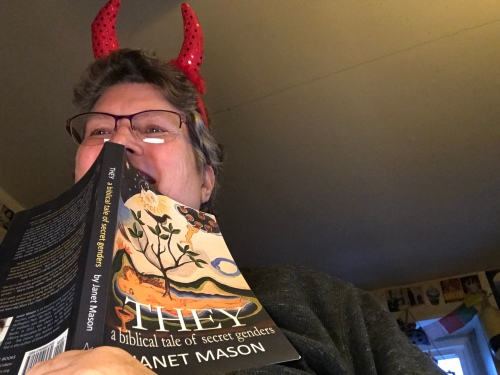They: A Biblical Tale of Secret Genders by Janet Mason

A taut, gripping, deeply intriguing tale…
Mason reimagines the life of Tamar from the book of Genesis as she takes readers on a stunning journey, vividly evoking the world of Old Testament women and intersex individuals. Content and happily barren, Tamar occupies a far different world from other women in the society, living as a hermit in the desert with her pet camel. When her twin sister Tabitha, a widower and the daughter-in-law of Judah, becomes pregnant after seducing a shepherd, Tamar connives a cunning plan to save her from being burned alive at the stake for the crime of adultery. Tabitha gives birth to intersex twins: Perez and Zerah. Tamar becomes attached to the twins and follows their line of intersex twins.
Familiar passages from the Bible come alive as Tamar questions the validity of many stories and wonders about the unanswered questions in the Bible (Eve’s so-called birth from Adam’s rib, the gender identity of the Garden of Eden’s serpent, the reference to God as a man).
As in the Legends of the Jews, Tamar in the novel is also endowed with a prophetic gift which allows her to know the future of her descendants (later in life) before she takes rebirth as an intersex. Mason vividly brings the period alive with rich details and poignantly evokes the strong bonds the women form as a sect.
Mason’s narrative is fluid and her prose clear and elegant.
Excluded from the public sphere and silenced by men, the women in the book are forced to stay dependent on men. But the female protagonists (Tamar, Judith, the Mother) in the book are fiery, cunning characters who know their ways around the stronger sex, becoming a resonant symbol of womanly strength, love, and wisdom.
Mason’s depiction of the lives of the women (living with the fear of casting as witches and getting burned alive on stakes for minor transgressions and prohibited from learning to read and write among other) explores deep roots of misogyny and issues of gender inequality (which are still prevalent in many communities), striking an occasional melancholy tone.
Without reverting to religious jargon, Mason’s book narrates the passions and traditions of the early Israelites while her characters’ gender fluidity leaves readers to contemplate their perceptions of present-day members of LGBT community. A book that is sure to garner Mason plenty of fans.
Highly recommended to lovers of literary fiction!
They: A Biblical Tale of Secret Genders
by Janet Mason
Buy now
Pub date August 24, 2018
Adelaide Books Publishers
ISBN 9781949180244
Price $18.22 (USD) Paperback, $7.66 Kindle edition








 Thankfully, religion is changing.
Thankfully, religion is changing.
 4) To tell my story to the world –
4) To tell my story to the world –


